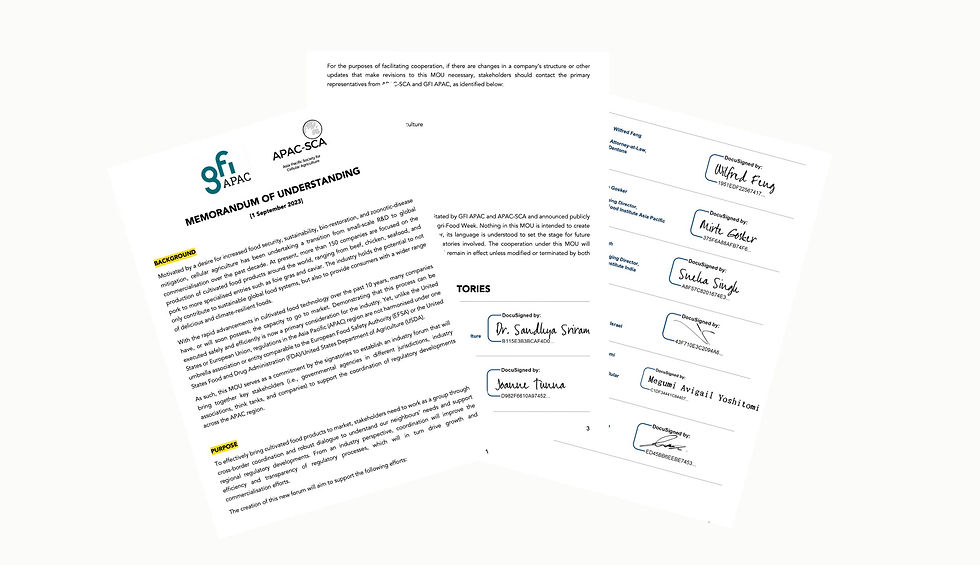New Cellular Agriculture Forum Aims to Accelerate Regulatory Approvals Across APAC
- calisa06
- Oct 30, 2023
- 3 min read
Updated: May 8, 2024

Many Asian countries have not yet established protocols for reviewing applications of cultivated meat and seafood, slowing the market entry of more secure and sustainable foods.
SINGAPORE – A new platform for cross-border dialogue between cultivated food companies, industry associations, think tanks, and governmental agencies and regulators in different jurisdictions will officially launch today at Singapore International Agri-Food Week (SIAW).
To date, only Singapore and the United States of America have approved the commercial sale of certain cultivated meat products, but many other countries are actively developing their own regulatory frameworks or considering doing so. The new entity, called the APAC Regulatory Coordination Forum, aims to complement that process through increased sharing of data and knowledge between countries, streamline review processes for companies that want to simultaneously enter multiple markets, and reduce trade barriers.
To mark the occasion, industry stakeholders from Singapore, Australia, China, Israel, India, Japan, South Korea, Malaysia, and Indonesia have signed an MOU that unites the signatories around the following goals:
Facilitate the coordination of regulatory efforts within APAC to build an effective cultivated food regulatory environment, minimising hurdles and bottlenecks.
Establish a mechanism for continuous and systematic cross-border dialogue between companies, industry associations, think tanks, and governmental agencies in different APAC jurisdictions. Our aim is to transparently share information, collaborate on inputs such as data or safety assessments, and provide open discussions and viewpoints between partners across the region.
Mutual recognition of coordinated regulatory frameworks in APAC (i.e., alignment on criteria for safety testing, labelling, and inspections), which would significantly reduce the time and resources needed for regulatory approval, while minimising trade barriers and cost to consumers. These efforts could potentially culminate in the development of trust between authorities to create “fast lanes” for approval of companies already authorised for sale in another regional country.
Ensure that cultivated foods have the ability to adhere to religious rulings and standards (i.e., halal and kosher), where coordinated efforts are needed to build consensus on this topic across the region.
Standardise regulatory approaches on novel topics that have yet to be addressed, such as hybrid product definitions and novel cell cultivation technologies.
Coordinate information across borders to all participants transparently, bringing each participating member up to date with current developments and trends.
“For cultivated meat and seafood to reach their full potential as food security and climate solutions, global distribution has to expand beyond early-adopter markets,” says GFI APAC Managing Director Mirte Gosker. “By bringing together industry leaders and regulatory officials from countries across Asia Pacific, we are working to reduce duplication of efforts, streamline international approval processes for novel food producers, and create a clear pathway to market for innovative new products.”
APAC-SCA Program Director Peter Yu believes that the Forum will bring forth new areas for collaboration in the long term: “Ultimately, we envision a clear and effective contingency for the industry as a whole towards commercialisation of cultivated food products across the region. We encourage the participation of any potential new members vested in these matters, located among any of our APAC member countries.”
For additional details on this new initiative, please visit https://www.cellagforum.info/.
***


